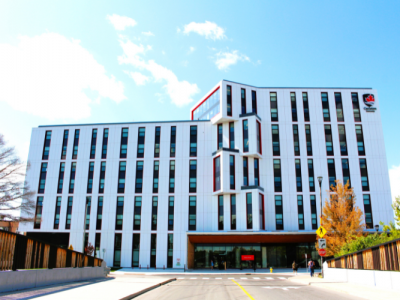Two Carleton University professors, Mohammad Reza Kholghy and Natalina Salmaso, have been announced as Tier 2 Canada Research Chairs (CRC). Kholghy will be the CRC in Particle Technology and Combustion Engineering and Salmaso will be renewed as the CRC in Behavioural Neurobiology. The two researchers will receive a combined $1.1 million in funding.
“Carleton attracts outstanding academics due to our existing strengths in multidisciplinary research,” said Rafik Goubran, vice-president (Research and International). “They bolster our leadership position in engineering and neurobiology. Congratulations to our newest CRCs who are making significant strides in addressing real-world issues.”
CRCs aim to achieve research excellence in engineering and the natural sciences, health sciences, humanities and social sciences. They improve Canada’s depth of knowledge and quality of life, strengthen the country’s international competitiveness, and help train the next generation of highly skilled people through student supervision, teaching and co-ordinating other researchers’ work.
Kholghy is focused on nanoparticle engineering with applications in energy storage, creating advanced materials, and sensing and measuring the impact of emissions on the environment. Particles are omnipresent. For example, people inhale millions of particles in the air they breathe. Dental fillings and medications combine several particles together. Car tires rely on carbon nanoparticles for their strength and functionality. New types of particles are increasingly finding applications in every aspect of people’s lives.
Kholghy is developing combustion engineering technology that enables large-scale production of nanoparticles with the desired properties, while limiting emission of polluting nanoparticles such as soot. Nanoparticle synthesis with flames offers a scalable alternative to conventional manufacturing methods, which often do not go beyond lab scale demonstrations. Understanding nanoparticle formation in flames also helps engineers design combustion systems with minimal, if not zero, soot emissions.
Salmaso continues her work investigating what makes some brains grow differently from others and how this contributes to brain health and disease.
The study of neurons and neuronal networks have been the focus of the majority of neuroscience research for almost a century and rightly so, since neurons form the networks that lead to the behaviours we observe. However, neurons form less than 50 per cent of the cells of the brain. The majority of brain cells are called glial cells, which are the support cells to neurons and are critical to all neuronal functioning. Salmaso’s laboratory focuses on understanding the function of these glial cells in order to ameliorate neuronal functioning in brain disease.
Recent work from Salmaso’s laboratory shows that glial cell “malfunction” may be central to psychiatric and neurological disease, including depression and anxiety disorders, as well as Parkinson’s disease. Salmaso’s work has also shown that glial cells change in response to sex hormones such as estrogen and that this may be important for some of the sex differences in brain disease. Her laboratory uses a variety of techniques to study glial cells in brain development and adaptability to understand how they contribute to brain disease.
The Canada Research Chairs Program (CRCP) stands at the centre of a national strategy to make Canada one of the world’s top countries in research and development. It invests approximately $295 million a year to attract and retain diverse, world-class researchers, and to reinforce academic research and training excellence in Canadian post-secondary institutions.
In 2000, Canada created a permanent program to establish 2,285 research professorships—CRCs—in eligible degree-granting institutions across the country.
Media Contact
Steven Reid
Media Relations Officer
Carleton University
613-265-6613
Steven.Reid3@carleton.ca
Follow us on Twitter: @CUNewsroom
COVID 19 Updates: https://newsroom.carleton.ca/coronavirus-covid-19/messages/
Monday, September 28, 2020 in News Releases
Share: Twitter, Facebook



